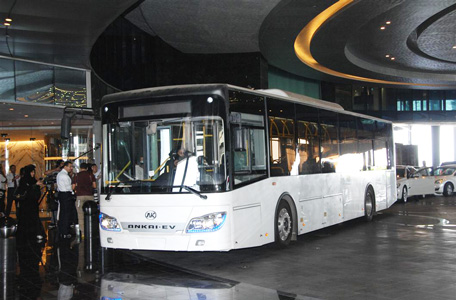Will run on various routes in metropolitan Abu Dhabi over six-month trial period
As part of its endeavours to promote sustainable transport, the Abu Dhabi Department of Transport has commenced trial operations of its first fully electric bus, which will run on various routes in metropolitan Abu Dhabi and its suburbs over a six month trial period.
The Ankai-branded vehicle is a standard city bus that is fully electric, not hybrid, using a plug-in charging technology, which is the most cost-effective.
The battery can reach 80% of capacity within 3 hours and 99% in four hours. Each full charge has an estimated range of 200 km.
Saeed Mohammed Fadel Al Hameli, Acting Director Organisational Development Division at the Department of Transport, said, “The trial operation of the electric bus is in line with the DoT’s sustainable transport strategy and aims to ascertain the total cost of ownership, gain a firsthand insight of benefits offered to service users, whilst studying and assessing the best and most efficient buses and technologies that fit with Abu Dhabi’s operating conditions and the atmosphere of Abu Dhabi.
“The bus will be subject to internal performance assessment via different routes and trip scenarios, such as city-based urban frequent start-stop profiles, and suburb profiles, before selecting the most feasible specifications.”
“This electric bus functions and operates like any normal bus expect that it is noiseless and accelerates faster.
“In order to prepare well, four selected drivers will be trained by the manufacturer and the distributor on the performance of the bus, thereby giving us hands-on experience of its features and how the use of air-conditioning and other supporting systems will drain its battery”, he added.
The DoT recently concluded a feasibility five-phase study on alternative fuels. It aims to develop strategies and methods promoting clean transportation culture, look into allocations of resources for sustainable development of transportation needs, identify strategies related to alternative fuels use, and review the use of alternative fuel solutions on local policies.


